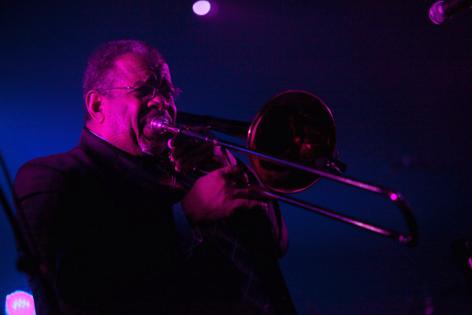Fred Wesley, trombone player for James Brown, still brings the funk at 81
Published in Entertainment News
ATLANTA — Trombonist Fred Wesley helped create the blueprint for funk music.
His precise, catchy brass riffs and solo performances were core elements on songs by some of funk’s most prominent architects, from James Brown to Parliament-Funkadelic bandleader George Clinton. Heard on classics from Brown like “Say It Loud (I’m Black and I’m Proud)” and “Sex Machine,” his trombone has been sampled on a number of popular hip-hop records, from acts ranging from Kris Kross to Tupac Shakur.
And Wesley, 81, has no intentions to quit.
Last year, he released “From the Blues and Back,” his first studio album in more than a decade. The collection of songs is a return to the bandleader’s blues roots.
Wesley said he still practices his instrument 30 minutes per day. “If you stop playing, your chops and the muscles in your face get weaker,” he said.
Wesley was born in Columbus and grew up on a farm. He moved to Mobile, Alabama, when he was 7 years old and began playing trombone at 12, continuing through a brief enrollment at Alabama State University and as a player in the Army band.
He got his big break playing in the Ike and Tina Turner Revue in 1962, and said witnessing the married musical act’s stage presence taught him and other bandmates to become better live performers.
“We learned how to dance and play our instruments at the same time and put a full show together. She had so much rhythm and drive, it made us all want to be great,” Wesley said.
In 1968, after receiving a referral by another band member, Wesley joined Brown’s band. His signature playing was captured on the Augusta singer’s “Cold Sweat,” “Mother Popcorn” and other tightly arranged songs.
His solos were often requested at random, challenging Wesley to constantly watch for Brown’s sporadic cues. “We rehearsed for a long time, and he would point out solos as he wanted them while the groove was still there,” Wesley said. “He called on me often.”
Wesley also remembered clashing regularly with Brown, although the band often submitted to Brown’s direction.
“We went along not because we thought it would be a great hit, but because he demanded that we went along with whatever he said. He was unorthodox and did crazy stuff, but he was onto something,” Wesley said.
The horn player left Brown’s band in 1969, returned two years later and became Brown’s musical director and arranger.
He says his second rotation with Brown, during which he performed on classic songs like “Pass the Peas,” “Hot Pants,” “Doing it to Death” and “The Payback,” was his real education on entertainment.
“I was in charge, so I was learning how to write, produce, record and lead sessions. If I did an arrangement and he didn’t like it, I’d do it again and get paid for it again,” he said.
Wesley was recruited to join Parliament-Funkadelic in 1975. The veteran musician called it a more laid-back environment but still regularly rehearsed, as producers Bootsy Collins and Clinton wanted Wesley to provide unique horn performances. He called Bootsy’s Rubber Band, one of Collins’ side projects, his favorite band.
“They just told me to be myself and do it to death. Anything that I felt, I could do,” he said.
Wesley became a sought-after session player and arranger for other major Black music acts, including the Gap Band, Barry White, Curtis Mayfield and the Count Basie Orchestra.
He admitted originally being against rappers and producers using his intellectual property but changed his tune after receiving royalty checks from Janet Jackson’s 1993 single “That’s the Way Love Goes,” which samples “Papa Don’t Take No Mess.”
“I was upset at first and kept wondered why these guys didn’t use their own music. Then, my son was telling me what all was being sampled, and I realized what they were doing was connecting the old with the new,” he said. “I appreciate young people sampling my music because it makes it last forever.”
Wesley pays his success forward by teaching music courses, which he’s led at University of North Carolina-Greensboro and the Louis Armstrong Jazz Camp in New Orleans, encouraging young musicians to pursue music and the arts.
“Anything they have a problem with, I’ve had it before and can share with them how to overcome it,” he said. “God gave it to me, so it’s my duty to give it back.”
He plans to continue creating, recording and performing music as long as he has a good band and good health.
“As long as I can stand up, I’m going to keep doing this,” Wesley said.
———
©2024 The Atlanta Journal-Constitution. Visit at ajc.com. Distributed by Tribune Content Agency, LLC.













Comments